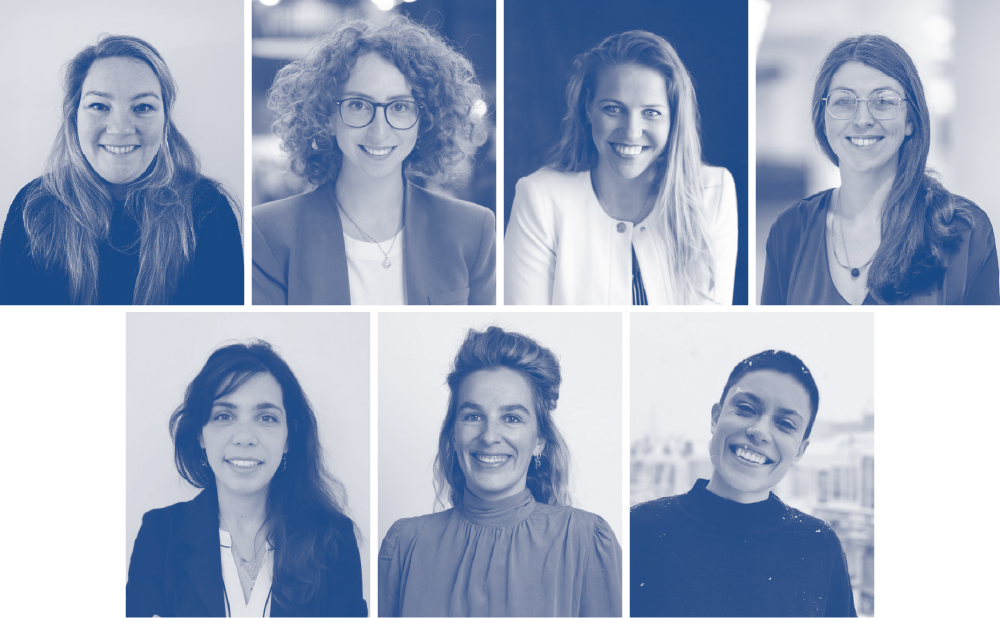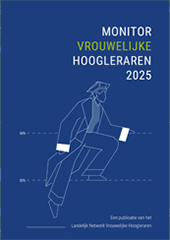DWSF Laureates 2024-2025
The LNVH board and bureau are pleased to announce the 2024-2025 Distinguished Women Scientists Fund laureates. This year the following 7 laureates will receive the DWSF travel grant:
Bodine Gonggrijp is a postdoctoral researcher at the Netherlands Study Center of Crime and Law Enforcement (NSCR) at VU Amsterdam. Bodine’s work addresses a central question in victimization research: to what extent are negative outcomes—such as mental health challenges, financial instability, and increased healthcare needs—caused by victimization itself versus pre-existing vulnerabilities?
She will use the grant to visit Dr. Brian Boutwell, Associate Professor of Criminal Justice and Legal Studies at the University of Mississippi. During this visit, she will present her research, which uses discordant twin designs to disentangle the consequences of victimization. In addition to presenting her research, she has been invited to host a workshop in quantitative genetics for faculty and graduate students. This workshop will introduce the fundamentals of twin and sibling research, including methodological applications such as the Co-Twin Control Design and provide a "how-to" guide for incorporating these methods into research, fostering knowledge exchange and stimulating new approaches within the academic community at the University of Mississippi.
Elisa D’Alessandro is a postdoctoral researcher at the Department of Biochemistry at the Cardiovascular Research Institute of Maastricht (CARIM) of Maastricht University. Her research focuses on atrial fibrillation (AF), a progressive cardiac arrhythmia driven by structural remodeling of the atria. During her PhD, she conducted extensive translational studies using the goat model of AF in collaboration with international experts from the RACEV consortium. Most importantly, she demonstrated that coagulation proteins drive atrial remodelling and proved that anticoagulation therapy can prevent these detrimental changes.
Elisa will use the grant to take part in the prestigious Young Investigators Award session at the European Heart Rhythm Association (EHRA) Congress 2025 in Vienna. Additionally, she will use the remaining funds to support part of the travel and accommodation costs for a six-month research visit to Professor Kramann’s laboratory at RWTH Aachen University. Prof. Kramann is a world-renowned expert in organ fibrosis and spatial multi-omics.
Marina Meester is an assistant professor of Veterinary Medicine at Department Population Health Sciences of Utrecht University. During her PhD, she applied phylodynamic methods to study hepatitis E virus transmission in pig farms. Hepatitis E virus is relatively straightforward to study, as its genetic evolution is mainly linear - it mutates but does not often reassort or recombine. Reassortment and recombination, or ‘genetic shifts’, are processes where genetic material is swapped between viral strains while co-infecting a single cell, creating hybrid progeny viruses. Genetic shift can rapidly alter a virus’s genetic makeup, increasing pathogenicity, and enabling immune escape. Phylogenetic and -dynamic methods often overlook genetic shift, as that non-linear evolution cannot easily be incorporated into phylogenetic trees. This is a significant limitation that Marina faces now that she wants to study other viruses than hepatitis E virus, such as swine influenza virus and PRRS virus, both of which frequently undergo genetic shifts.
To overcome that limitation, it is critical to integrate reassortment and recombination in phylodynamic models. Therefore, Marina will use the grant to visit Dr. Nicola Müller at the University of California, San Francisco. Dr. Müller is a pioneer in incorporating reassortment into phylodynamic models and has successfully applied his methods to study human influenza and SARS-CoV-2 virus dynamics. By visiting his lab, Marina aims to learn how to apply and adapt his methods to viruses that spread in animal populations and spread between humans and animals.
Carolin Gaiser is a postdoctoral researcher at the departments of Neuroscience & Child and Adolescent Psychiatry at Erasmus MC. During her PhD Carolin created the first large-scale cerebellar growth models in children and adolescents using detailed cerebellar atlases highlighting functional and structural regions of interest. This work uncovered novel growth trends in the cerebellum, mirroring those in the cerebrum, and providing evidence for directly related cerebello-cortical developmental trajectories. These openly accessible growth models are of great value in uncovering cerebellar deviations and understanding their implications in neuropathology.
Research has disproportionately focused on the cerebrum, largely omitting the cerebellum, the so-called "small brain". Using large-scale, longitudinal structural neuroimaging, Carolin has previously found that cerebellar regions linked to cognitive functions show prolonged growth compared to sensorimotor areas. These developmental patterns mirror those in the cerebrum and support the idea that the cerebellum directly influences cortical maturation. To further explore this cerebello-cortical connectivity and interaction, Carolin aims to learn and apply advanced diffusion tensor imaging (DTI) techniques specifically tailored to track cerebellar pathways. Overcoming these technical barriers requires specialized expertise. She will therefore use the grant to work with Monica Luciana at the University of Minnesota, whose group has extensive knowledge in DTI research in a large population of developing children.
Isabel Weinhäuser is a postdoctoral researcher at the department of Hematology at the University Medical Center Groningen (UMCG). Her PhD work revealed that AML patients harbour increased M2-like macrophages linked to immunosuppression and poor outcomes. Functionally, she showed that M2 macrophages promote aggressive leukaemia by inducing resistance to phagocytosis and driving leukemic cells towards oxidative phosphorylation — a clinically targetable vulnerability. This work, involving diverse techniques and extensive collaboration, laid a strong foundation for integrating immune biology with advanced single-cell technologies to identify novel therapeutic approaches.
For her next research project, Isabel aims to map the molecular programs in HSPC and their immune microenvironment across different stages of leukaemia progression at a single cell level, using longitudinal samples. She aims to identify BM niche factors that 1) serve as biomarkers for early therapeutic intervention in high-risk individuals progressing from CH/MDS to AML, and 2) guide the development of personalized combination therapies to improve AML outcomes. To advance this research, Isabel will use the grant to collaborate with Dr. Lynn Quek at King’s College London, who has a strong background in single cell platforms and leads a laboratory with the necessary infrastructure and expertise for hands-on training in the technical aspects of single-cell processing and the bioinformatics tools required for single-cell analysis.
Javiera Sabina Garcia Meneses is a postdoctoral researcher at the University of Groningen. Her PhD thesis was entitled 'Following the traces of affect: labor subjectivities of (female) child protection policy workers in Chile'. The core lines of Javiera's research are affect theory, work subjectivity, qualitative methods, and gender. Her postdoctoral project is entitled 'Assemblages of Violence from a Decolonial Feminist Approach: Focusing on Agency for the Transformation of the Child Protection Organizations in Chile'.
Javiera will use the grant to foster collaboration between the University of Groningen - particularly the Research Center for Equity and Social Justice in Child Welfare and the Faculty of Behavioral and Social Sciences - and the consortium of the HORIZON- MSCA project 'Reporters. Reassembling politics across children's cultures to scale intersectional pedagogies' with NGOs in the Global South, while strengthening and expanding the University’s international academic research networks. She will conduct data production for 3 months in three different child protection NGOs. After that she will work on data analysis with experts on the Chilean welfare system and qualitative ethnographic methods from the Pontificia Universidad Católica de Valparaíso and the Universidad de Chile.
Lieke van der Veer is a postdoctoral researcher at the Erasmus School of Social and Behavioural Sciences at the Erasmus University Rotterdam. Her doctoral thesis is entitled: 'Care in a Frictional Field of Forces: Assistance and Advocacy by and for Recent Refugees in Rotterdam.' During extensive fieldwork, she studied how refugee-led support initiatives are mediated by funding regimes, by advisors in refugee advocacy who perform as brokers, by citizenship ideals, and by bureaucratic practices of group-making. As a postdoctoral researcher, she works in the NWA-funded project ‘Dilemmas of Doing Diversity.’ In this project she studies knowledge production, alliance formation, and forms of administrative artistry that underpin anti-discrimination policies.
She will use the grant to take part in the Scholar Residence Program at the Max-Planck-Institute for the Study of Religious and Ethnic Diversity. During the residency, Lieke intends to work on three academic articles that emerge from the ethnographic research she is currently doing. One of the articles she wants to write concerns diversity advocacy coalitions and how dilemmas of doing diversity are given with (and implied in) the collaborative infrastructure between CSOs and local government actors in itself.

From left to right (starting at the top): Bodine Gonggrijp, Elisa D’Alessandro, Marina Meester, Carolin Gaiser, Isabel Weinhäuser, Lieke van der Veer, Javiera Sabina Garcia Meneses


